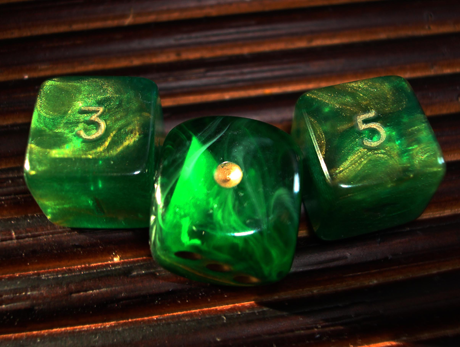Welcome to Guidance, Private Sanctuary’s source for tips and techniques for the Pathfinder Roleplaying Game, written by Everyman Gamer Alexander Augunas. Today, we’re going to be talking about the 15-minute adventuring day.
Remember when I gave my ridiculously long backstory about how I came to be a Pathfinder designer? I’m going to reference it for a second to lead into this topic. Go refresh your memory on my story if you need to.
So I come home from college a graduate and I immediately scrounge a Pathfinder game together out of my local friends. Gotta love my priorities! Anyway, I get the guys together and they build their characters. I give them a quest and they’re off into the scary-dark woods to find some old grandma who had gone missing. This is made even more hilarious due to the fact that every PC was evil; the party included a goblin ranger, a cleric of a Lawful Evil god, and an antipaladin. Can’t get much more evil then that, hrm?
So the party is off looking for grandma when they encounter several weird things. Heavily mutated and corrupted fey; specifically a flock of dryads and a treant. The party fights them and I watch as the cleric blows through all of his channel negative energy attacks and damaging spells in this one combat. The combat ends and the cleric immediately says, “All right, guys, I’m out of magic so we need to rest for the day now.” The party agrees and they stop to rest for the night.
Has this ever happened to you? Well folks, as a GM this was my first ever encounter with the concept of the 15-minute adventuring day, and I hated it. Today’s topic: the 15-minute adventuring day. What it is, how to spot it, and how to counter it.
Identifying the Problem
When we talk about the “15-minute adventuring day,” what is the problem we are trying to identify? The problem isn’t that the adventuring “day” only lasts 15 minutes. For example, sometimes the GM designs his adventures around a single combat: penultimate dragon hunting encounters sometimes take this form. In addition, sometimes the dice aren’t in the PC’s favor and they are forced to expend most of their resources in what should have been a relatively easy fight. In both of these situations, resting after a single encounter is not a problem because the 15-minute adventuring day was instated by GM design or as an absolute last result.
Where the 15 minute day becomes a problem is gaming is in situations where the “fight-rest” pattern becomes a player tactic rather than a GM decision or a last resort. In my example above, my cleric player willingly expended all of his resources with the assumption that he would be allowed to rest immediately in order to regain his expended power. In effect, a 15-minute adventuring day is a player tactic where one or more PCs wastefully use their resources during an encounter with the assumption that they will be permitted to rest immediately after to regain those spent resources without penalty.
Why Is this a Problem?
Put simply, the problem with the 15-minute adventuring day is that it ignores one of the cardinal design elements of the 3.5/Pathfinder systems: limited use. Many abilities in Pathfinder are designed to be powerful options with the downside that they are only available for a limited under of times each day. As a matter of fact, the entire spellcasting system is built around the concept of limited use = powerful when used. This is why the biggest offenders of the 15-minute adventuring day are usually classes with magical abilities. Ultimately, this practice removes tactical strategy from the game, trivializes encounters, and causes stories to progress at a sluggish, unrealistic pace. All-around nastiness.
Combating the Problem
So as a GM, how do you stop your players from partaking in the 15-minute adventuring day? As Pavlov would say, you get the players to associate bad things happening in-game with wasting time, much as we do in the real world. Here are some tips:
- Wandering Monsters: Let’s face it; there are just as many creatures that are active during the day as the night. Plenty of animals are active in the day to hunt your foes with. Most bandits and thugs operate by stalking marks during the day and ambushing them at night: if you are going to sleep at noon, you’re just making their work easier, so throwing bandits is fair game. Even if it might not be realistic, you should assault day-resting players players without fail both day and night. The next time they rest, if they choose to make camp at nightfall, be generous and spare them from random encounters, maybe do it two or three times to really cement the behavior. Just make sure you roll some nice anyway (even if you aren’t going to throw monsters at them); you want your players superstitious. And players, even if you’re smart enough to be reading my advice columns to see what your GM might do to you, do YOU feel lucky enough to call your GM out on the fact that he/she might be trying to condition you? DO YOU? … didn’t think so.
- Time Limit: Putting time limits onto your quests is a great way to foster a sense of urgency that will make your players want to adventure longer. This limit can be to prevent something bad from happening (you have three days to clear out the post before the orcs come back to bolster its defenses) or to sweeten their reward (the orcs will send their trading caravans out in three days: if you wait too long, much of the post’s wealth will be gone).
- Chases: When your players are racing to catch someone/beat someone to a destination, you’d be surprised how much faster they move and how much better they conserve their resources.
And that about wraps up my thoughts on the 15-minute adventuring day. What do you think? Do you or your players regularly employ this tactic, or is this the first you’ve ever heard of it? How do you handle players who try to perform a 15-minute adventuring day? Do you think this play style is a problem? Leave your answers and comments below, and I look forward to seeing you next time for the next installment of GM Guide!
Alexander “Alex” Augunas has been playing roleplaying games since 2007, which isn’t nearly as long as 90% of his colleagues. Alexander is an active freelancer for the Pathfinder Roleplaying Game and is best known as the author of the Pact Magic Unbound series by Radiance House. Alex is the owner of Everyman Gaming, LLC and is often stylized as the Everyman Gamer in honor of Guidance’s original home. Alex’s favorite color is blue, his favorite Pathfinder Race/Class combination is kitsune pathfinder savant, and his favorite pastime is endlessly throwing waves of kobold raiders against PCs who dare to try to metagame at his table with the 15-Minute Adventuring Day tactic. Fun times. Fun times.






A spell caster should never have a legitimate excuse for a 15-minute adventure day.
Every spell caster should have Scribe Scroll. Even in Pathfinder Society where Scribe Scroll is not legal for play, my casting characters invest heavily in scrolls. The biggest problem I ever run into as a caster is which spell or scroll do I want to cast next!